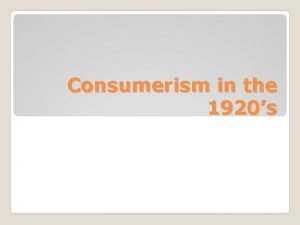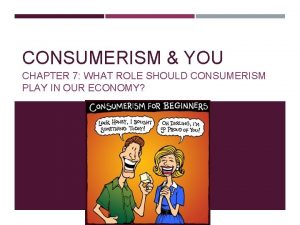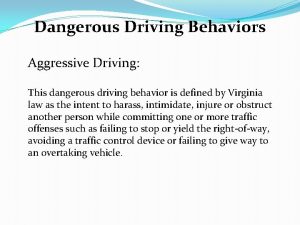Consumerism the driving force of westernised culture Consumerism








- Slides: 8

Consumerism: the driving force of westernised culture Consumerism as a social and economic order and ideology encourages the acquisition of goods and services in ever-greater amounts.

Is it ironic that this ad pops up when I type the word ‘consumerism’? We have a responsibility to be more aware of our spending and if we really need to buy more things.

Some facts and figures http: //www. tai. org. au/documents/dp_fulltext/DP 77. pdf • Australian households generate very high levels of waste creating over 2. 25 kilograms person per day, more than 17 million tonnes of landfill in 2002 -03 (ABS 2005). • According to the ABS, the majority of Australians (57 per cent) state that they are concerned about environmental problems, down from 75 per cent in 1992 (ABS 2004). • Young people are more likely to engage in wasteful consumption. • After food, Australians waste $1. 59 billion paying interest on interest free credit cards, $1. 56 billion on clothes, accessories and personal care items that are never used, $412 million on books and CDs that are never read or listened to, $501 million on gym memberships and exercise equipment and $186 million on the wasteful use of electricity within the home.

John Paul II and the Problem of Consumerism Volume 9, Number 5 - September and October 1999 http: //www. acton. org/pub/religion-liberty/volume-9 -number-5/john-paul-ii-and-problem-consumerism Pope John Paul II regarded consumerism as a threat to the freedom of the human person to live according to the higher demands of love rather than to the lower pull of material desires. One of the moral issues of this concept is that when we give in to consumerism, we are inclined to put ourselves above others. Pope John Paul II locates the problem of consumerism in the sphere of culture, and specifically in the relationship of authentic human freedom to the possession of material goods. It is in our culture to overspend, to do some ‘retail therapy’, go on a ‘shopping spree’ and end up with ‘buyers remorse’.

Frenzy of consumerism – to buy more, we have to work more! http: //www. smh. com. au/small-business/managing/work-in-progress/a-frenzy-of-consumerism 20121206 -2 ayut. html The Sydney Morning Herald printed an article in 2012 about the “work-and-spend trap” They stated that marketers persevere with advertising to convince us we’re not sexy enough, popular enough, smart enough, or (whatever) enough, unless we purchase what they’re selling. In order to fund the lifestyles to which we’ve become accustomed, we work. In many cases, we overwork (50 hours per week). But is this actually making us happy? People are incurring debt and working longer hours to pay for the high-consumption lifestyle, consequently spending less time with family, friends, and community organizations. And what would happen if we were all to collectively reduce our consumption? Would the economy tank? Jobs lost? Would there be a recession; maybe even a depression? Is this all-consuming consumerism an inescapable part of life?

As Consumerism Spreads, Earth Suffers, National Geographic says http: //news. nationalgeographic. com. au/news/2004/01/0111_040112_consumerism. html National Geographic News, October 28, 2010 Approximately 1. 7 billion people worldwide now belong to the "consumer class"—the group of people characterized by diets of highly processed food, desire for bigger houses, more and bigger cars, higher levels of debt, and lifestyles devoted to the accumulation of non-essential goods. • The report addresses the devastating toll on the Earth's water supplies, natural resources, and ecosystems exacted by a plethora of disposable cameras, plastic garbage bags, and other cheaply made goods with built in product-obsolescence, and cheaply made manufactured goods that lead to a "throw away" mentality. • "Most of the environmental issues we see today can be linked to consumption, " said Gary Gardner, director of research for Worldwatch. • Some aspects of rampant consumerism have resulted in startling anomalies. Worldwatch reports that worldwide annual expenditures for cosmetics total U. S. $18 billion; the estimate for annual expenditures required to eliminate hunger and malnutrition is $19 billion.

How much do you consume? Click on the link to find out! http: //www. footprintnetwork. org/en/index. php/GFN/page/calculators/

What can YOU do about it? There are things you can do to combat the negative effects of consumerism. . If you are up for the challenge? *Become an Anti-consumerism campaigner, such as Thomas Aquinas who said that “Greed is a sin against God, just as all mortal sins, in as much as man condemns things eternal for the sake of temporal things”; in that vein, Francis of Assisi, Ammon Hennacy, and Mohandas Gandhi said that spiritual inspiration guided them towards simple living. *Think like a minimalist look at needs vs. wants *Measure the effect of advertising. Be aware of why, when, how much and how often advertising affects your spending habits *Nothing new for a year http: //www. inkedincolour. com/nothing-new-rules/ *5 steps to Combat Consumerism 1. When you want to purchase something – put it on a 30 day list. Read the other tips here… http: //abreathofsimplicity. com/5 -simple-steps-to-combat-consumerism/















